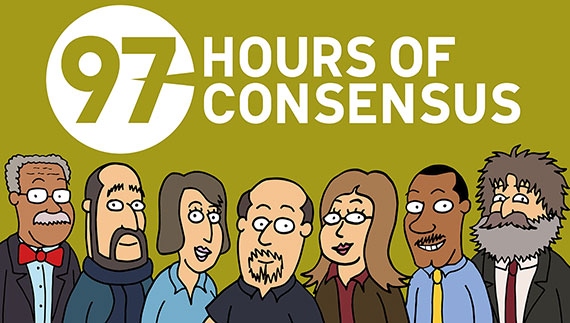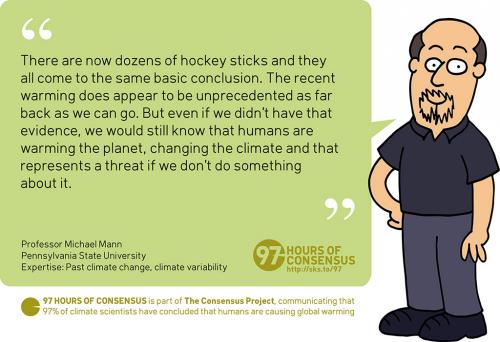97 hours of consensus: caricatures and quotes from 97 scientists
Posted on 7 September 2014 by John Cook
Climate scientists from across the globe feature in our 97 Hours of Consensus campaign addressing one of the most significant and harmful myths about climate change. Each hour, beginning at 9am Sunday EST, September 7th, we'll publish a statement and playful, hand-drawn caricature of a leading climate scientist. Each caricature lists the scientists’ name, title, expertise and academic institution.

97 Hours of Consensus communicates the fact that 97% of climate scientists have concluded that humans are causing global warming. The research, conducted by scientists at The University of Queensland’s Global Change Institute, University of Reading, Michigan Technological University and Memorial University of Newfoundland found that 97% of relevant climate papers endorsed human-caused global warming. The paper was published in the academic journal Environmental Research Letters in May 2013.
In contrast, less than 10% of Americans are aware of the 97% consensus on climate change. This ‘consensus gap’ matters. When the public aren’t aware of the overwhelming scientific agreement on global warming, they’re less likely to support action to mitigate climate change. 97 Hours of Consensus seeks to close the consensus gap.
The campaign begins on 9/7 (the date itself reinforcing the 97% consensus). An interactive webpage featuring the quotes and caricatures is available at http://sks.to/97
How You Can Help
- Retweet our tweets, sent out via @skepticscience every hour for the next 97 hours. Tweet excerpts from your favourite quotes, using the #97Hours hashtag, or retweet your favourite caricatures (Raymond Pierrehumbert is a personal fave)
- Share our Facebook posts, also published on the hour every hour.
- Share our images posted on skepticalscience.imgur.com.
- Blog about #97Hours and embed our quotes/caricatures (which are all creative commons licenced and free to be republished)
Acknowledgements
97 Hours of Consensus began as a whim when I thought it might be cool to caricature 97 climate scientists. I fast learnt what a big task I was taking on. This project was made possible by a dedicated collaborative effort by the Skeptical Science team. Tracking down short, pithy, stand-alone quotes from climate scientists is not as easy as it sounds and required digging through interviews, articles and long YouTube talks. Many thanks to Dana, Things Break, Rob Painting, Bob Lacatena, Sarah, John Hartz, Baerbel and Kevin C for helping track down the quotes. The task of posting a new cartoon every hour for 97 consecutive hours was made substantially more manageable by Doug Bostrom who automated much of the process. The amazing interactive webpage at http://sks.to/97 was coded by Bob Lacatena. And this whole project wouldn't have been possible without the tireless collection and organizing of information by Baerbel.































 Arguments
Arguments































@ Tom Curtis at 06:43 AM on 12 September, 2014
"Therefore we no longer include classics scholars among the people we relly on to understand physics. Instead we relly on scientists."
If we rephrase this argument you say that: "We rely on scientists to understand physics." I will say that there is much more to it than that. For important matters we are not likely to rely on scientists. We will likely require to see independent data demonstrating that the result of applying the physics is ok. When the product is a measurement result or a prediction, the responsible will likely require to see data demonstrating the uncertainty of the prediction and that it is without systematic errors. The application of physics rapidly becomes extremely complex also to the scientists applying it. This complexity implies that nobody can be sure that end product is ok without testing it. That is why testing and experimenting is an extremely important part of physics.
Imagine constructing a complex instrument, like a new electronic weighting scale or a much more complicated instrument. To build the instrument you depend on hardware components, electronics, software, primary measurements, correctly set parameters, physical models etc. Many scientists are required to design the instrument, develop the models, build the instrument, develop the software and test it. The instrument is based on physics, but still, there is an enormous amount of possible errors which can be made when designing and building the instrument. Hence you do not know the uncertainty of the instrument or if there is a significant systematic error in the instrument before you perform a calibration. A calibration is performed by letting the instrument perform measurement on a number of test weights traceable to international standards. The central information on the calibration certificate consist of the measurement result from the weighting scale, the mass of the test weights and the uncertainty of the mass of the test weights.
Even if no single person has all the competence that is required to design and build the instrument, the calibration certificate is very easy to understand. The calibration certificate can be completely understood by a person without any of the competencies required to design and build the instrument. Hence the capabillities of the instrument can be completely understood without having to rely on the scientists required to design and build it. There are also other ways to demonstrate that a complex construction works for its intended use. Even if I have no clue how it is made, I can still tell if a television works. There is also more to it, because, even the scientists who built the complex instrument cannot be sure about the uncertainty of the instrument and that it is without systematic errors without also using the same kind of data a layperson can use to comprehend the capabilities of the instrument. Hence I think it is more valuable to say that we rely on other scientists, text book´s and data tools to understand physics and construct a product or a model, we rely on testing to se if it works. A properly performed test and properly presented test results can be easy to comprehend. To summarize I would say that We do not rely on scientists in physics, we rely on data from calibration, testing and experiments. In that respect, I would also like to quote William Edwards Deming:
“In God we trust; all others bring data.”
dhf @51, you have been caught out arguing from a clearly false premise, whose only support has been your mere assertion. It would be nice of you to acknowledge that your premise was in fact false, and has now been comprehensively refuted. Merely picking an isolated sentence as a bridge to an urelated rhetorical sally is evasive and shows further discussion with you to probably be unfruitful.
For what it is worth, while testing calibration is a useful test on theories, it often involves subtleties that require expert knowledge to understand, and hence it is not true that layman can check calibrations without detailed research. In particular, the nearest analog of "calibration" in climate science is validation of models, which is a very complex subject. In particular, it involves assessing the interplay of probabilities of multiple factors which are not independent; the ability to assess the significance of scale issues; and the ability to assess the relevance of timing of short term variable events such as ENSO (which because chaotic, can be reproduced statistically in models, but not with regard to exact timing and magnitude of particular events).
The denier strategy has been to simplify that complexity by focusing on just one variable (GMST) over a cherry picked interval (typically 1998 forward) and to declare the "instruments" to have failed because GMST almost drops out of the uncertainty range. They frequently claim that it has dropped out of the uncertainty range by treating 1998 (which almost exceeded the uncertainty range) as a mean value thereby offseting the temperatures relative to model predictions.
Further, nearly all of the purported model/observation discrepancy on GMST vanishes if models are contrained (either by selection or by constrained responses in the ENSO region) to match actual ENSO fluctuations. That is easilly demonstrable by a number of means, the simplest of which is simply taking trends of La Nina, neutral, and El Nino years seperately; and hence should not be subject to dispute. AGW deniers, however, simply ignore it as a factor in an approach best described as dishonest.
These approachs are not scientific. They are pseudo-scientific.
They are also not on topic on this thread.
What is on topic is your apparent claim that these "calibrations" can be easilly performed by laymen, but apparently have escaped the experts notice. Sorry, I see no point in debating such absurdities.
@ Tom Curtis at 10:58 AM on 16 September, 2014
You are right, my premise were false, my assertion was wrong, it is not correct to say that: "Very many are trained through education and profession to recognize and disregard arguments containing logical fallacies."
Thank you for your response to my false assertion.
@ Tom Curtis at 10:58 AM on 16 September, 2014
It is not my claim that calibrations can be performed by laymen. One point I tried to make was that properly presented test result can be easy to comprehend even if the model is complex and that properly presented data are strong arguments.
Magma, The three deniers are John Christy, Richard Lindzen, and Roy Spencer.